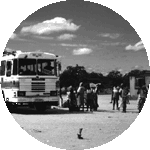
 |
||
 |
In a moment of history the village became globalsed. At the same
time, people on the street, at the bus station, in the shop give
him a call, introducing their local conditions into the global network. |
 |
 |

MULONGA LOOP – FOCUS GROUP DISCUSSION
WED 28 AUG 2002 – Binga ITC
(part_1)
Participants :
Mr Jossam Munkuli – Simonga, Siachilaba
Mr Peter Mungombe - Simonga, Siachilaba
Ms Margaret Moombe - Simonga, Siachilaba
Ms Jenet Muzamba - Simonga, Siachilaba
Million Katema – Nyele player, Binga
Mr David Mungombe – playwright, scriptwriter, dramatist, Binga
Ms Penny Yon – Interviewer
Mr Sengamo Ndlovu – Moderator
[Simonga CD played in background, explained purpose of dicussion; Map of loop shown and brief explanations given.]
Jossam Munkuli:
In 1997 when we went to Austria, we didn’t know we were going to meet such a thing. We saw films of Kariba, about the filling of the dam. Something made me as if I was present during that time. I told my children about it. Now, meeting something done in 1950 and never known to us … Very good history for everyone in Zimbabwe, even we Tonga, even Simonga group, which is now here. I have so many comments … all these people .. we also do the same history. What we have learned in 1997 will never fade.
Also saw a film in Vic Falls when we performed there. I don’t think there are many changes. Now, I don’t think there are people still alive from that time. We saw Musimbo, which is not done now. It can fade if not recorded.
Very important, even for those not yet born. We’ll learn more like this.
Peter Mungombe:
Excluding what’s been done since 1997, before, there was not written work, no record for our sons and daughters to read as history. Now managed to record stories and old stories. There is more information from old people. This will bring us to meet more friends we did not manage to meet before.
What do you think of the people who did these recordings?
It was good of them to do for us. Now it comes to us, we can learn. Now known through computers and by seeing in films. I feel proud that Tonga culture is going out to people. If we manage to do this, it is very important to tell others.
Margarent Moombe:
It is important for me because it’s a lesson to a child (from a mother). For example in Europe, they showed how they built the dam. Since I was born, I never saw that, just heard how they were taken from Zambezi River. It is good for us to learn from old people and improve us and makes us remember long ago.
What do you think about those women who were singing then? Do you think your life today is the same as theirs or different, and how?
Quite different, but no difference. I was taught by my grandmother. Now we are getting from tape recorders, but my grandfather I used to hear.
Jenet M
Very happy hearing music from 1950s. It could have been lost, but they kept it in cold places and now it is preserved forever. It’s amazing.
Million Katema:
Thanks very much to Austrians who brought out things which were hidden, made by Tonga fellows. In any Tonga area, we never knew there was a record. It comes from far away, Norway, come back to Tonga by that. When they recorded, they didn’t tell us or show us. IT’S A NEW THING TO US, BUT SUNG BY OURSELVES. We heard a story, and films in Europe were seen, but we Tonga, we are few [who heard about it]. It’s a funny thing, to me. WHEN YOU REMIND US OF OUR CULTURE WE ARE VERY HAPPY FOR THAT.
Before 1950s when our mothers wanted to carry a baby, they used goat skins, not a towel, That goat skin was prepared to come soft. That baby would grow up to 6 years without changing. Now every few months a towel which is nearly $1000.
MORE DISCUSSION IMMEDIATELY AFTER LOOP BROADCAST.